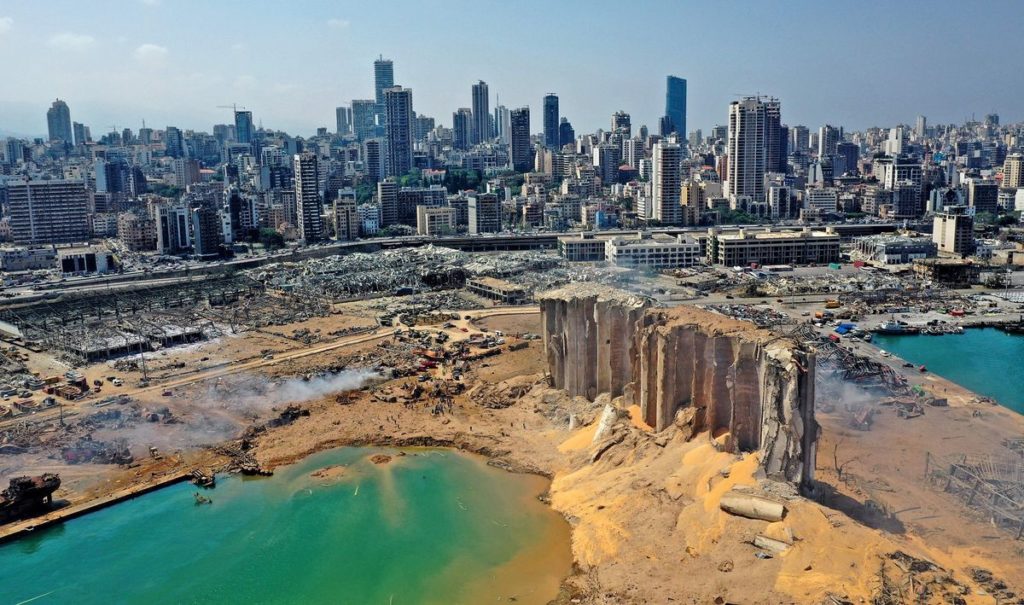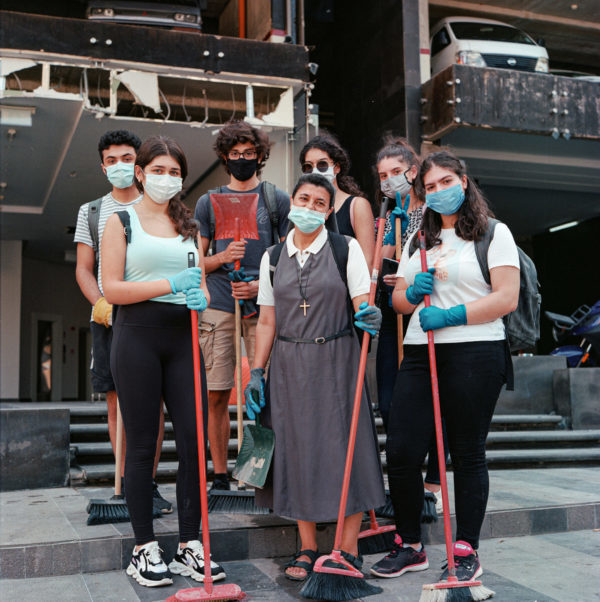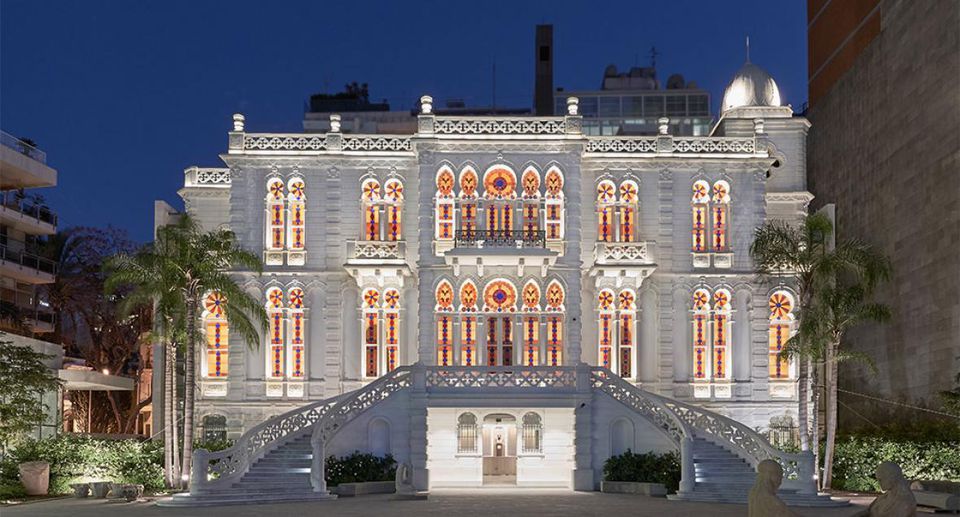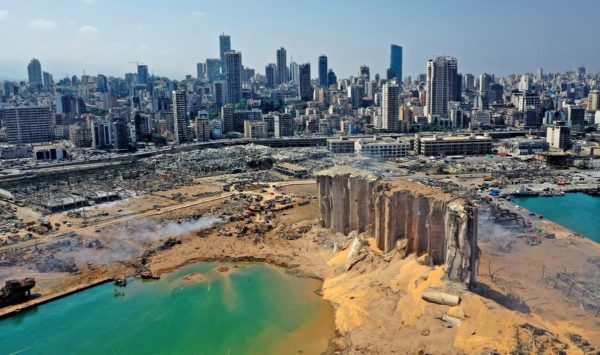BY RANIA ABOUZEID PHOTOGRAPHS BY RENA EFFENDI
BEIRUT, LEBANON How do I write about what they did to you, Beirut? About what they did to us? I’m supposed to have the words. I’m a writer and an international journalist, familiar with telling stories that are difficult, complicated, and often about violence, but my fingers are frozen by the fear of failing you. You, the Lebanese capital, my beautiful, chaotically vibrant city by the Mediterranean Sea.

Just hours after your disfigurement, the song “For Beirut” by Fairouz, our beloved national icon and one of the most celebrated Arab singers of all time, was again being played and widely shared. It’s the song that radio stations played during the darkest days of the Lebanese civil war in the 1980s, when my relatives cowered in basement shelters to avoid the shelling above. The war cleaved you into Muslim and Christian halves, a city that has since melded together.
“From my heart a greeting of peace to Beirut,” Fairouz sang. “She is wine from the spirit of the people, she is bread and jasmine from their sweat, so how did she come to taste of fire and smoke?”
Today, we are asking the same question.
They mutilated you with their negligence, corruption, and utter disregard for human life. Forgive us—we didn’t know. The public didn’t know that 2,750 tons of ammonium nitrate were dangerously and improperly stored in Warehouse 12 at the Port of Beirut, and that this fertilizer often used in improvised explosive devices had been there since 2013. The team of 10 firefighters dispatched to their deaths to extinguish a small blaze near the warehouse didn’t know either. Their superiors, now heartbroken, hadn’t been informed. (This is the deadly history of ammonium nitrate.)
But they knew, at least some of them: certain customs officials, senior members of the judiciary and the security forces, the president and the recently resigned prime minister, as well as other senior politicians who have been in and out of government since the deadly cargo was unloaded. They knew, and they did nothing to remove the danger.
I wasn’t in my apartment, about a mile from the port, shortly after 6 p.m. on August 4, when the ammonium nitrate ignited. It sent a mushroom cloud into the bright blue sky and shock waves that sucked the air, windows, doors, and concrete out of homes before spewing some of that detritus back.
The explosion killed more than 180people—the majority Lebanese but also Syrians, Bangladeshis, and Egyptians, among others. It wounded at least 6,000 and left hundreds of thousands homeless. People are still unaccounted for under the rubble. Their families are waiting for them. Body parts gathered from various locations are still being identified.
This horror isn’t even our only crisis this year; it’s just the most recent. We were already overburdened with an economic and financial collapse superimposed on a global pandemic and exacerbated by political incompetence and civil unrest. And now this blast. At a time when we can’t even console each other with hugs and physical connection.
How many disasters can Lebanese endure simultaneously, and why must we?
A cruel poverty
They mismanaged the economy so badly that our currency, the pound, has lost some 80percent of its value since late last year. Businesses have shuttered, unemployment has skyrocketed, along with the cost of goods and services. Half of the country has plunged into a cruel poverty made worse by a banking system that has locked us out of our accounts, initially reducing the amount of dollars we could take out, then allowing limited withdrawals only in the collapsing Lebanese pound. Millions of Lebanese have lost their life savings. Powerless, we’ve watched the value of our money melt, even as some of them have spirited six billion dollars into offshore accounts.
Layered onto all this is COVID-19, cases of which are rising fast. Infections in the country have passed the 13,000 mark, with deaths surpassing 120. At the same time, at least three major hospitals and numerous medical clinics in Beirut were damaged in the explosion, limiting access to medical care for blast victims, COVID-19 patients, and other sick people.
I envy countries that have to deal only with the coronavirus.How do I convey the enormity of the ferocious physical destruction they inflicted upon you, and the insulting negligence that followed the blast—one of the biggest nonnuclear explosions ever recorded?
When I returned to my own home a few days after the explosion, I didn’t know where to start. Windows crunched under my feet. Shards of glass embedded, dagger-like, in my furniture. Fragments of glass glistened on my walls like razor-sharp diamonds. Splintered doors blown off their hinges, cracked concrete walls, shredded curtains, ruined personal effects.
I’m ashamed to mention such things because at least I have an apartment. Some buildings collapsed, and tens of thousands of other homes are wrecked.
Still, that’s just the material destruction. It could have been worse—that’s what we all tell each other. It’s just blown-out windows and doors. It’s just a few cuts. It’s not that many stitches. I’m still alive.
But what of the families who have lost loved ones, of the people who are injured, maimed, emotionally traumatized?
Why do we live in a country that has conditioned its people to normalize and downplay private pain caused by public officials?
Is it because we know that our appeals are unlikely to register with the men and women who are supposed to work for the country’s benefit instead of their own? Is it because of a word that’s often ascribed to the Lebanese: resilient? That clichéd curse. The Lebanese are not resilient because we want to be but because we have to be—in a state that offers us little in the way of rights or services or basic dignity. It’s tiring.
Members of the ruling political class have exploited Lebanon’s system of sectarian governance for decades. A small country of some five million people, Lebanon is divided among 18 officially recognized sects, with designated sect-apportioned political roles. (Precisely how many people there are in Lebanon is unknown—there hasn’t been a census since 1932—to avoid the thorny question of sectarian demographics.) The president must be a Maronite Christian, the prime minister a Sunni Muslim, the speaker of the house a Shiite Muslim. Parliament’s 128 seats are equally divided between Christians and Muslims.
When the 15-year civil war ended in 1990, the sectarian warlords swapped their military camouflage for fancy suits and parliamentary positions. They granted themselves immunity for crimes committed during the war. These same men—or their sons, widows, or other designated political heirs—have played musical chairs in government ever since. Cynically stoking dormant fears and memories to avoid accountability, they claim to represent their religious communities, hiding behind that representation to insist that any personal criticism is really a criticism of their sect.
Before the blast, the International Monetary Fund (IMF) was in talks with the Lebanese government to secure funds to ease the crippling financial burden on ordinary citizens, but Lebanon’s leaders rebuffed the IMF’s insistence on institutional reforms. The creaking system had collapsed under the weight of its own corruption, and those who defined it feared exposing the extent of its rot.
The politicians know that reforms would hobble their system of patronage and the fiefdoms they’ve carved out from public funds. A weak state is good for their dynastic family businesses and/or political parties. It means citizens have to rely on these leaders for services the state should provide but doesn’t, or for jobs that should be merit-based but are often political appointments.
After the blast, almost no one—not foreign states or international donors or members of the vast Lebanese diaspora—wanted to give Lebanon’s politicians any money for the relief effort (although some did). They assumed that the political elite would pocket it. As if the foreign states that now talk about bypassing Lebanon’s corrupt hands didn’t spend years shaking those same hands. The bulk of the relief money instead is being funneled to the Red Cross and Red Crescent, the United Nations and NGOs.
Lebanon’s government resigned after the explosion. In his departing speech, Prime Minister Hassan Diab said that the system of corruption in Lebanon is bigger than the state and that the state is bound by this system.
In other places, such as Australia and New Zealand, where I grew up, a blatant acknowledgment of malfeasance would not go unscrutinized or unpunished. But who is going to investigate legislators who set and break laws in a country without an independent judiciary, where some judges are backed by one sectarian leader or another and are expected to do that leader’s bidding?
That’s why many Lebanese have little faith in an ongoing investigation by authorities into the explosion at the port. Some expect a cover-up or that low-level port officials might be blamed while senior leaders are shielded from prosecution. There are calls for an international investigative tribunal—but also fears that such a tribunal might be politicized.In Beirut, justice and accountability are more often empty slogans and lofty aspirations than realities. Will this time be different, and if so, how and why?
This is Rania’s hand’
My family lived in New Zealand and Australia during the civil war. As a child, I remember how my mother would end her letters to my grandmother in Lebanon by tracing the outline of my hand. “This is Rania’s hand,” she wrote, including my age at the time.
In the summer of 2006, during a war between Israel and the Lebanese political party and militant group Hizballah, my sister and her young family were evacuated from Lebanon back to Australia. I stayed and reported the story.
Overnight, it seemed, the country had been catapulted back to my parents’ civil-war era and its troubles, although this time, the enemy was external, not from within. I wondered when I’d see my sister again, how long this conflict would last, and if I might also one day receive letters from my sister with the outline of my young niece’s hand.
In the days after August 4, that niece of mine, now a teenager in Lebanon, was packing care parcels for a local charity to distribute in Beirut.
Why must every Lebanese generation experience the trauma of sudden, violent chaos and its aftermath?
When I entered my apartment after the blast, the memory of my late maternal grandmother walked in with me. I thought of her and the challenges she’d survived. My grandparents’ three-story home was demolished, twice, during the civil war. I knew that was why my mother didn’t have any childhood photos. My late grandfather, proud and stubborn, built and then rebuilt the house twice. My grandmother once told me she couldn’t even retrieve a fork from the rubble of her home. I looked around my apartment and considered myself lucky. I still had a home, with walls and furniture. I was uninjured, and in a kitchen drawer, I still had cutlery.
My sister went down to the main street to see if anybody might help us move some of the heavier debris and all the shattered glass. Teams of young volunteers from all over the country, from across its sectarian and political landscapes, armed with shovels and brooms bought at their own expense, had descended on Beirut’s most damaged neighborhoods. They knew better than to wait for Lebanese authorities to help. Groups from the Syrian and Palestinian refugee communities Beirut has long hosted joined them, as well as African and Asian migrant workers.

My sister asked a cluster of passing scouts for one volunteer. Twenty-three followed her into my home. The group had traveled by bus for three hours from Zahle, a city in the Bekaa Valley. The explosion had shattered hearts and homes, but these selfless young people, representing the best of us, were helping mend them. Two days later, several members of the same team returned to see if I needed further assistance.
Some volunteers and local NGOs set up stalls offering free food and water. One man distributed water bottles from the trunk of his car. A couple went house to house donating detergents, apologizing that they couldn’t afford to offer more aid than that. All of this in a country with hyperinflation and a deep economic malaise.
A rage directed at them
Beirut, your children are grieving for you, not just in the city and elsewhere in the country but also in the Lebanese diaspora that extends from Australia and New Zealand to North and South America, from Europe to Africa. Lebanon’s greatest export has always been its people, many of whom left because of crises and conflicts. The shock waves that ravaged the capital are reverberating in our minds. The streets are seething with a rage directed at them. The same phrases are repeated by rich and poor alike: They blew us up. They stole our money. What more can they do to us? Aren’t their millions enough, aren’t they sated yet? Why won’t they just leave us to live in peace? And most ominously:
Hang them all. It’s a sentiment expressed in social media posts, in conversations on the streets, and in new graffiti of nooses painted on buildings, or what remains of them, in the most ravaged parts of the city. The people’s anger is nuclear. At a recent protest, mock gallows were erected and cardboard effigies of several Lebanese leaders were “hanged.”

The sounds in my neighborhood, meanwhile, have changed from the tinkling of glass being swept up to the pounding of hammers as people repair their homes as best they can. Banners are strung in the streets: “We are staying” and “Beirut will rise.”
I haven’t yet replaced my doors or curtains or removed the glass embedded in the walls, but I am home, and I too plan to stay. This time, just in case, my new windows will consist of tempered glass, to reduce the risk of deadly projectiles when the next crisis happens.
Beirut, you are no stranger to adversity. You have been destroyed and rebuilt seven times since antiquity, or so we’re told in Lebanese folklore. This newest calamity, perhaps, is the eighth.
“The wounds of my people have blossomed, and the mothers’ tears,” Fairouz sang in “For Beirut,”a song still poignant today. Its closing lines are my promise to you: “You, Beirut, are mine. You are mine. Embrace me.”
Rania Abouzeid is a Beirut-based journalist and the author of No Turning Back: Life, Loss, and Hope in Wartime Syria, as well as the upcoming Sisters of the War, to be published in September 2020. She is the recipient of numerous awards and fellowships, including at New America and the Harvard Nieman Foundation. Follow her on Twitter @raniaab
Rena Effendi is an award-winning photojournalist whose work focuses on post-conflict societies, the environment, and social justice. She is a regular contributor to National Geographic. To see more of her work, follow her on Instagram or on her website.
Source: The National Geographic


Leave a Reply
You must be logged in to post a comment.